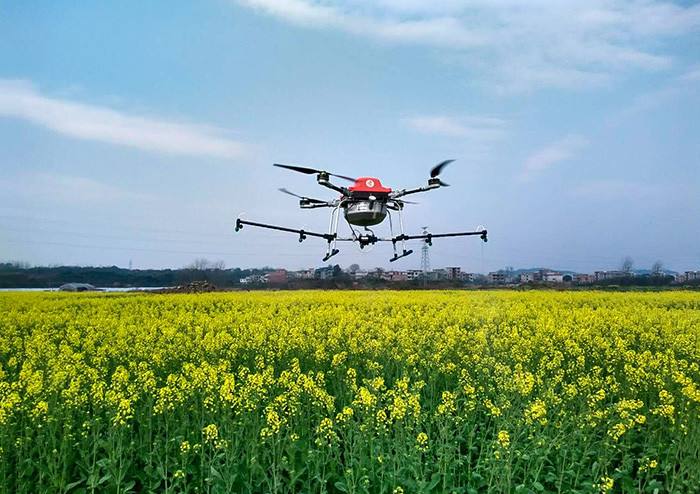Japan’s agriculture is facing challenges such as an aging workforce and high agricultural production costs. With the progress of science and technology, Japan has begun to develop unmanned agriculture. Intelligent devices such as small drones, unmanned agricultural machinery, and small agricultural robots are gradually replacing traditional manual farming methods.
Small drones can be used for pesticide spraying and other operations. As of the end of 2018, the number of small drones registered with the Japan Agriculture, Forestry, Fisheries and Aviation Association reached around 1500, and the number of skilled operators was nearly 5000.
In order to promote the further popularization and safe use of drones, the Ministry of Agriculture, Forestry and Fisheries of Japan has recently formulated the first plan to popularize small drones in the agricultural field, including expanding the use of small drones in production status analysis, pesticide and fertilizer spraying, and prevention and control of bird and animal pests. The plan states that by 2022, the area sprayed by drones with pesticides will be expanded from the current 20000 hectares to 1 million hectares. In addition, Japan has established a joint meeting composed of government and civil representatives to further popularize small drones.
However, there are still some technical issues that need to be addressed to promote small drones. For example, it is necessary to develop materials suitable for spraying fertilizers, achieve uniform sowing through technological updates, and how to maintain the stability of the machine body during the operation process. In March this year, Hanoi, Ibaraki Prefecture Prefecture, Japan held the second “Search for the Possibility of Agricultural UAVs Competition”. In addition to conducting drone operation competitions for spraying herbicides and fertilizing operations, the two-day competition also held a seminar inviting various industries, universities, and research institutes to provide suggestions and suggestions on solving drone technical problems.
In addition to small drones, unmanned agricultural machinery is also an important field of agricultural artificial intelligence. Recently, the Ministry of Agriculture, Forestry, and Fisheries of Japan began conducting intelligent agriculture pilot projects for small unmanned aerial vehicles and unmanned agricultural machinery throughout the country. This pilot project selected 69 projects across various regions, involving different conditions of agricultural land. The experimental content includes rice cultivation, dry land cultivation, vegetable cultivation, animal husbandry, and so on. The pilot work will last for two years. The Ministry of Agriculture, Forestry and Fisheries will promote relevant technologies based on relevant pilot data.
Major agricultural machinery enterprises in Japan are following the trend and turning the development trend of unmanned agriculture into business opportunities. Many enterprises are accelerating the intelligent and unmanned development of agricultural machinery such as tractors and excavators. In 2017, Japanese agricultural machinery company Kubota released a tractor that can perform unmanned operations under manual monitoring. The company also plans to launch new driverless tractors and Rice transplanter this year, and plans to launch new driverless Combine harvester in 2020.
Japanese agricultural machinery enterprises are also developing new intelligent Rice transplanter, small excavators that can be remotely operated, etc. Among them, the Rice transplanter can detect the depth and fertility of the soil in the field instantaneously through the sensor installed on the wheel, so as to sow appropriate fertilizer while transplanting. Small excavator operators can remotely drive with the help of 3D images as long as they wear a windshield shaped display. This type of unmanned excavator can play a role in fields such as mountain cultivation and transporting wood.


No reply content